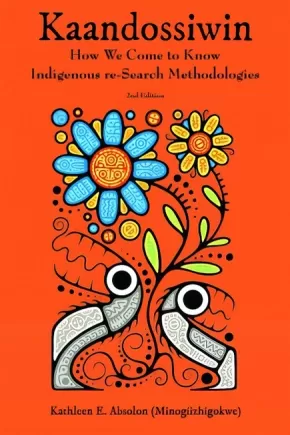Kathleen E. Absolon
Kathleen Absolon is Anishinaabe kwe from Flying Post First Nation Treaty 9. Her relationships to the land, ancestors, Nation, community, and family deeply informs her re-search. She is a Full Professor in the Indigenous Field of Study, Faculty of Social Work and the Director of the Centre for Indigegogy at Wilfrid Laurier University.
Books (1)
Synopsis:
Indigenous methodologies have been silenced and obscured by the Western scientific means of knowledge production. In a challenge to this colonialist rejection of Indigenous knowledge, Anishinaabe re-searcher Kathleen Absolon describes how Indigenous re-searchers re-theorize and re-create methodologies. Indigenous knowledge resurgence is being informed by taking a second look at how re-search is grounded. Absolon consciously adds an emphasis on re with a hyphen as a process of recovery of Kaandossiwin and Indigenous re-search. Understanding Indigenous methodologies as guided by Indigenous paradigms, worldviews, principles, processes and contexts, Absolon argues that they are wholistic, relational, inter-relational and interdependent with Indigenous philosophies, beliefs and ways of life. In exploring the ways Indigenous re-searchers use Indigenous methodologies within mainstream academia, Kaandossiwin renders these methods visible and helps to guard other ways of knowing from colonial repression. This second edition features the author’s reflections on her decade of re-search and teaching experience since the last edition, celebrating the most common student questions, concerns, and revelations.
Educator Information
Table of Contents
Part One: Preparation For The Search
1) An Introduction to Preparing for Re-Search: Having Tea & Bannock
Re-storying and restoring location
Restoring self: Locating My Self
Decolonizing and Indigenizing My Re-search
Language and Terminology
Chapter Outlines
2) Indigenous Re-Search: Past, Present and Future
Indigenous Peoples’ Cultural History and Research
Oral Traditions and Narrative
Indigenous Knowledge Resurgence: Shifting Landscapes
Trailblazers: Re-searchers and their Searches
3) Colonial Research Trauma My Own Search: A Journey of Making Meaning
4) The Search Trail and Pathway
Part Two: Wholistic Re-Search Methodologies
5) Wholistic Worldviews and Methodologies
6) The Roots: Paradigms, Worldviews and Principles
Paradigms and Worldviews
Principles
7) The Flower Centre: Self as Central
Self
Location
Situate Self in the Search
Memory
Motive and Purpose
Search for Congruency
8) The Leaves: The Methodological Journey
An Organic Process
Travelling
Transformation
Healing
9) The Stem: Backbone and Supports
Critical Consciousness
The Role of Critically Conscious Indigenous Scholars
Indigenous Searchers’ Strengths and Supports
10) The Petals: Diverse Methodologies
Spirit: Protocols, Ceremony and Honour
Heart: Relationships, Reciprocity and Community
Mind: Respecting Indigenous Knowledge
Body: Doing, Working and Creating
11) The Enviro-Academic Context
Fences and Gatekeepers
Allied Theories
The Committee
Writing Oral Traditions and Other Ironies
Thorny Prickly Challenges
12) Indigenist Re-Search Projects and Methodologies: The Last 10 Years
13) Leaving Good Footprints and Winding Down
Additional Information
304 pages | 6.00" x 9.00" | Paperback | 2nd Edition







